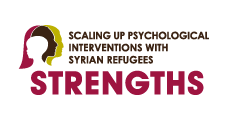The STRENGTHS project is featured in the blog of the Global Health, Epidemiology and Genomics (GHEG) GHEG is an open access journal from Cambridge Journals. It offers open access publication combined with peer-review standards set by an international editorial board, all backed by Cambridge University Press and their commitment to quality.
Scalable psychological interventions for Syrian Refugees – blog post
The Middle East, North Africa and Europe currently host millions of Syrian refugees who have fled violence and destruction. Many have lost their loved ones, homes and belongings and their journeys to escape the Syrian conflict have often been dangerous and full of hardship. The life of a refugee or asylum seeker brings a whole new set of challenges and uncertainties. The erosion of social support systems (family, neighbours, friends) to whom individuals can turn to in the case of emotional distress only compound this. Not all refugees will experience serious mental health problems, but many will face serious emotional distress.(1) Research shows that conflict-affected populations suffer higher levels of mental health problems, such as post-traumatic stress disorder (PTSD) and major depression, than non-affected populations.(2) Mental health issues are often so pervasive within these populations that conventional ways of assistance (for example regular psychotherapy that is often long-term and requires specialists) are not available. Even the most robust health systems will struggle to provide sufficient care to a high influx of patients with mental health concerns. This is currently the case in all refugee-hosting countries. Across the Middle East, there is a shortage of trained specialists who can provide high quality mental health care. In Europe, there are a limited number of Arabic speaking mental health care professionals, and the methods of psychotherapy employed are often not tailored to the needs of refugees. This limits access to appropriate mental health services for this vulnerable population. The STRENGTHS project, funded by the European Commission’s Horizon2020 programme, aims to provide and scale-up evidence-based and cost-effective mental health interventions for Syrian refugees. Fifteen universities, non-governmental organisations and international organisations based in Syria’s surrounding countries Turkey, Lebanon and Jordan (which host the majority of refugees), Egypt and in Europe (Germany, Switzerland the Netherlands and Sweden) will jointly develop the project’s research activities. These consist of a series of formative research activities, material translation and adaptions, and randomized controlled trials, in different country contexts, of mental health interventions developed by the World Health Organization (WHO). Please go to GHEG to read the post in its’ full length


